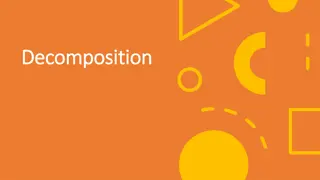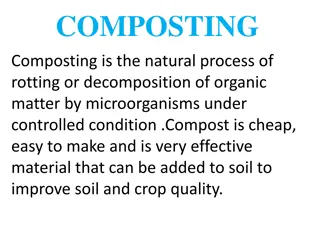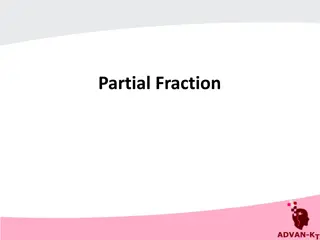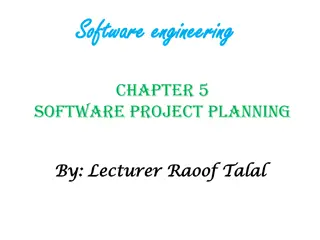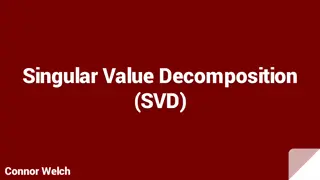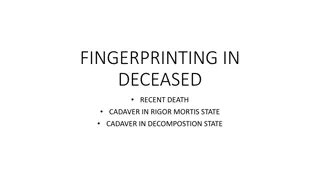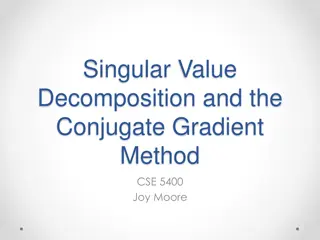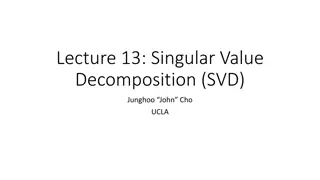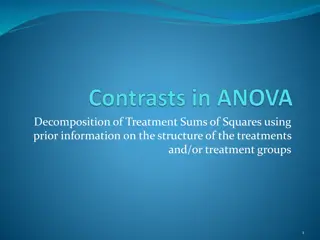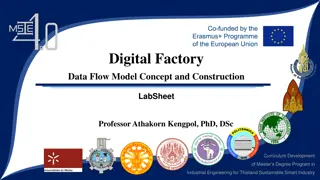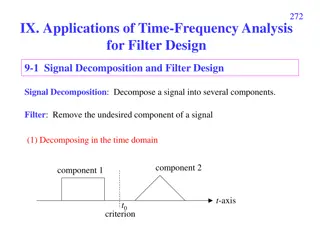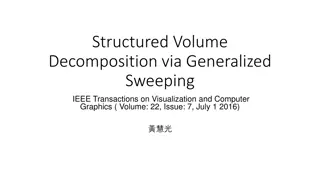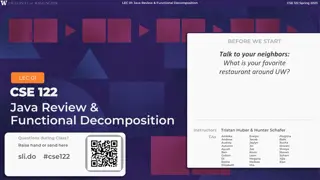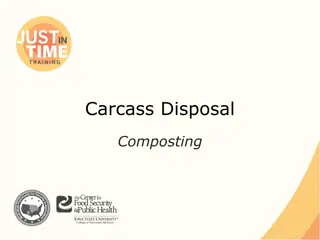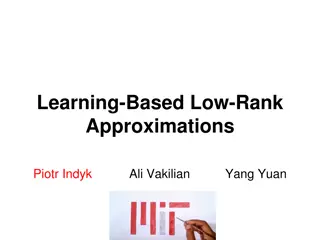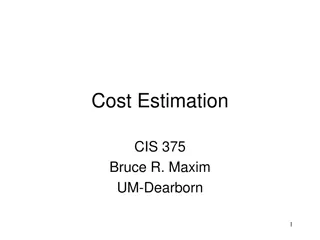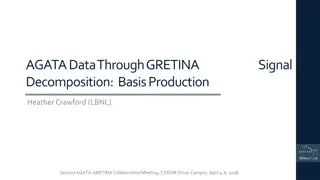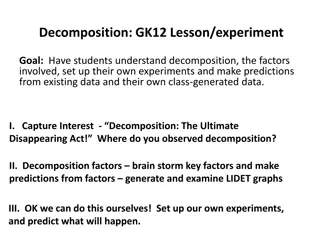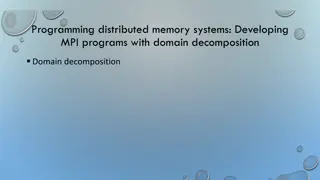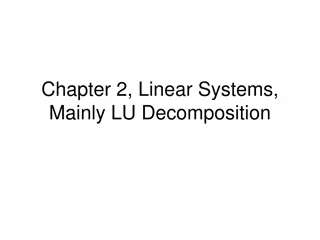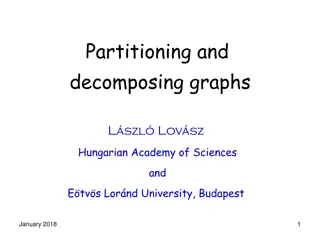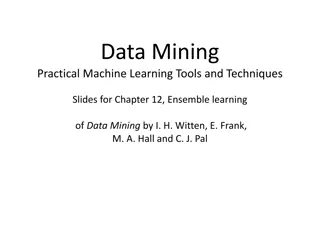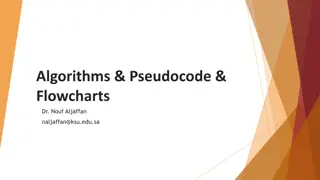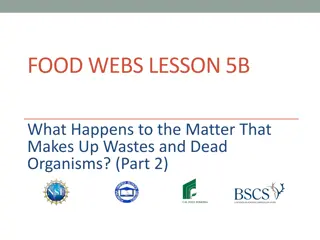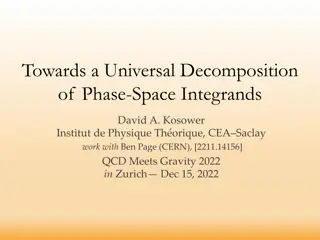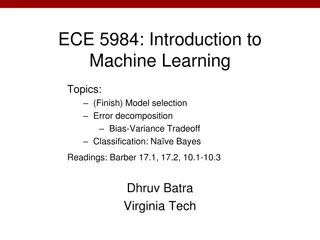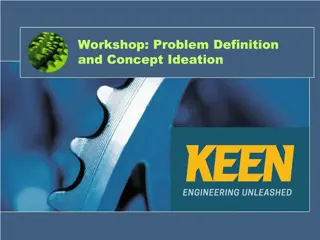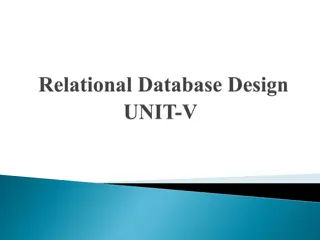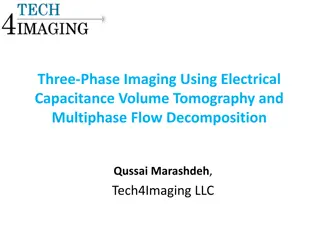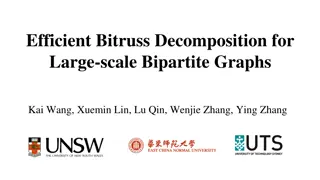Understanding the Fate of Herbicides in Soil
The fate of herbicides in soil is influenced by factors such as micro-organism decomposition, chemical decomposition, photodecomposition, adsorption by soil, surface runoff, leaching, plant uptake, and volatilization. Micro-organisms like algae, fungi, actinomyces, and bacteria play a crucial role i
6 views • 7 slides
Understanding the Power of Decomposition in Problem Solving
Learn about the concept of decomposition and its importance in problem-solving scenarios in both real-life and Computer Science. Discover how breaking down complex problems into manageable sub-problems can lead to efficient solutions. Explore how decomposition aligns with algorithmic thinking and en
1 views • 11 slides
Effective Methods of Composting for Sustainable Soil Enrichment
Composting is a natural process of organic matter decomposition, beneficial for improving soil quality. The Bangalore Method, Construction of Pit, Filling the Pit, Modified Bangalore Method, and Padegaon Method are efficient techniques used to produce high-quality compost for agricultural purposes.
0 views • 13 slides
Parallel Implementation of Multivariate Empirical Mode Decomposition on GPU
Empirical Mode Decomposition (EMD) is a signal processing technique used for separating different oscillation modes in a time series signal. This paper explores the parallel implementation of Multivariate Empirical Mode Decomposition (MEMD) on GPU, discussing numerical steps, implementation details,
1 views • 15 slides
Understanding Partial Fraction Decomposition
The partial fraction decomposition method is a powerful technique used to simplify rational functions by breaking them into simpler fractions. It involves reducing the degree of either the numerator or the denominator. Learn about proper and improper fractions, simple and repeated factors, and how t
0 views • 17 slides
Software Project Planning and Estimation Techniques
The chapter discusses software project planning and estimation techniques, focusing on an example of LOC-based estimation for a computer-aided design application. It explores preliminary statements of software scope, major software functions, and the use of decomposition techniques for estimating li
0 views • 24 slides
Understanding Singular Value Decomposition (SVD)
Singular Value Decomposition (SVD) is a powerful method for solving systems of linear equations or matrices that are singular or close to singular. When LU-decomposition or Gaussian elimination fail, SVD provides a stable matrix decomposition helpful in various applications. It is particularly usefu
0 views • 17 slides
Postmortem Fingerprinting Techniques in Deceased Individuals
Postmortem fingerprinting is essential in cases where identification is challenging due to factors like mass disasters or decomposition. This process involves preliminary preparations, methods of recording fingerprints, and specific techniques for cadavers in different states, such as recent death o
0 views • 21 slides
Understanding the Singular Value Decomposition
The Singular Value Decomposition (SVD) is a powerful factorization method for matrices, extending the concept of eigenvectors and eigenvalues to non-symmetric matrices. This decomposition allows any matrix to be expressed as the product of three matrices: two orthogonal matrices and a diagonal matri
0 views • 35 slides
Computational Thinking, Algorithms & Programming Overview
This unit covers key concepts in computational thinking, including decomposition, abstraction, and algorithmic thinking. Decomposition involves breaking down complex problems, abstraction focuses on identifying essential elements, and algorithmic thinking is about defining clear instructions to solv
1 views • 5 slides
Understanding Singular Value Decomposition and the Conjugate Gradient Method
Singular Value Decomposition (SVD) is a powerful method that decomposes a matrix into orthogonal matrices and diagonal matrices. It helps in understanding the range, rank, nullity, and goal of matrix transformations. The method involves decomposing a matrix into basis vectors that span its range, id
0 views • 21 slides
Understanding Singular Value Decomposition (SVD) in Linear Algebra
Singular Value Decomposition (SVD) is a powerful technique in linear algebra that breaks down any matrix into orthogonal stretching followed by rotation. It reveals insights into transformations, basis vectors, eigenvalues, and eigenvectors, aiding in understanding linear transformations in a geomet
3 views • 18 slides
Understanding Decomposition of Treatment Sums of Squares
Decomposition of treatment sums of squares involves utilizing prior information about treatment structure to analyze treatment group means through contrasts and hypothesis testing. This process allows for the testing of specific hypotheses and the creation of F-statistics. In an example scenario wit
4 views • 12 slides
Data Flow Diagram: Introduction and Construction in Industrial Engineering
This content explores the concept of Data Flow Diagrams (DFD) in the context of creating a Master's Degree Program in Industrial Engineering for Thailand's smart industry. It discusses the benefits of DFD, techniques for diagram decomposition, and the formalization of DFD rules for consistency check
0 views • 10 slides
Applications of Time-Frequency Analysis for Filter Design
Signal decomposition and filter design techniques are explored using time-frequency analysis. Signals can be decomposed in both time and frequency domains to extract desired components or remove noise. Various transform methods like the Fourier transform and fractional Fourier transform are employed
1 views • 35 slides
Structured Volume Decomposition via Generalized Sweeping
This paper introduces a new technique for generating a simple and predictable structured hex-mesh, providing better convergence properties and more space efficiency in computer graphics and engineering applications. The method involves computing 3D harmonic function decomposition, slicing the object
0 views • 30 slides
Java Review & Functional Decomposition in CSE 122 Spring 2023
Lecture 01 in CSE 122 covers Java review, functional decomposition, and code quality. Announcements include a Java review session, programming assignments, and reminders on Java syntax. The session encourages active participation through in-class activities using Slido polls. Students are also urged
0 views • 24 slides
Bi-Decomposition of Large Boolean Functions Using Blocking Edge Graphs
Bi-decomposition is a vital technique in logic synthesis for restructuring Boolean networks. This paper discusses the methodology of breaking down large Boolean functions using Blocking Edge Graphs (BEG) to simplify physical design and reduce complexity. The process involves constructing BEG, perfor
1 views • 29 slides
Effective Carcass Disposal Through Composting
Composting carcasses with organic materials can accelerate biological decomposition, destroy pathogens, and produce a nutrient-rich humus. Proper carbon-to-nitrogen ratios, moisture levels, oxygen maintenance, and temperature control are crucial for the efficiency of the composting process. Mixing a
0 views • 21 slides
Learning-Based Low-Rank Approximations and Linear Sketches
Exploring learning-based low-rank approximations and linear sketches in matrices, including techniques like dimensionality reduction, regression, and streaming algorithms. Discusses the use of random matrices, sparse matrices, and the concept of low-rank approximation through singular value decompos
0 views • 13 slides
Understanding Nucleon Spin Decomposition and Proton Spin Problem
Explore the complex realm of nucleon spin decomposition and the enigmatic proton spin problem, delving into concepts like orbital angular momentum, quarks and gluons' helicity, and longitudinal double spin asymmetry in polarized deep inelastic scattering. Learn about the spin crisis, gluon polarizat
0 views • 26 slides
Software Development Cost Estimation Best Practices
Explore key principles and techniques for accurate cost estimation in software development projects. Discover the importance of the 5WHH principle, management spectrum, critical practices, resource estimation, estimation options, and decomposition techniques for improved project planning. Learn abou
0 views • 40 slides
Basis Production Procedure for AGATA through GRETINA Signal Decomposition
This presentation outlines the detailed procedure for generating basis signals in the context of AGATA data processed through GRETINA signal decomposition. It covers the generation of pristine basis signals, superpulse analysis, and the creation of cross-talk corrected basis files. The process invol
0 views • 19 slides
Understanding Decomposition: Experiments & Predictions for Students
Engage students in understanding decomposition through hands-on experiments, predictions based on factors, and analysis of data. Explore various decomposition examples, set up experiments with different variables, and analyze outcomes to enhance comprehension. Utilize resources like LIDET graphs and
0 views • 10 slides
Developing MPI Programs with Domain Decomposition
Domain decomposition is a parallelization method used for developing MPI programs by partitioning the domain into portions and assigning them to different processes. Three common ways of partitioning are block, cyclic, and block-cyclic, each with its own communication requirements. Considerations fo
0 views • 19 slides
Understanding Linear Systems and LU Decomposition
Explore the fundamental concepts of linear algebra, including matrix notation, existence of solutions, vector spaces, computation tasks, and LU decomposition techniques. Learn about Gauss elimination, Crout's algorithm, and how to solve linear systems efficiently using LU decomposition.
0 views • 25 slides
Procedural Decomposition and Static Methods in Programming
Understanding procedural decomposition and static methods is essential in programming to reduce redundancy, organize code effectively, and manage complexity. Procedural decomposition involves dividing a problem into methods, while static methods help in code reuse and managing complexity. By designi
0 views • 18 slides
Enhancing Wind Turbine Performance Through PCWG Activities
The PCWG (Performance Characterization Working Group) aims to improve real-world wind turbine performance prediction beyond the simple Power=P(v) equation. By introducing concepts like Inner-Outer Range Decomposition and Average-Specific Decomposition, the group addresses factors such as environment
0 views • 13 slides
Graph Partitioning and Decomposition Techniques
Explore various graph partition problems and decomposition methods such as regularity partitions, representative sets, and 2-neighborhood representations. Learn about techniques to aggregate, scale down, sample, and divide graphs for efficient analysis and computation. Discover how nodes can be repr
0 views • 45 slides
Ensemble Learning in Data Mining: Tools and Techniques
Ensemble learning in data mining involves combining multiple models to improve predictive performance. Techniques such as bagging and boosting are utilized to create a single, more accurate model from diverse experts. The bias-variance decomposition is employed to analyze the impact of training set
0 views • 15 slides
Understanding Algorithms, Pseudocode, and Flowcharts in Programming
Learn the fundamental concepts of algorithms, pseudocode, and flowcharts in programming through a series of detailed explanations and visual representations provided by Dr. Nouf Aljaffan. Explore the stages in program development, creating algorithms, computational thinking principles, and the pract
1 views • 20 slides
CSE 122 Spring 2023: ArrayList Lecture Overview and Example Program - Movie Favorites
In this CSE 122 lecture for Spring 2023, the instructors Tristan Huber and Hunter Schafer introduced ArrayLists, covered announcements, and presented a practice problem highly relevant for the course. They discussed the addAll method, techniques for functional decomposition, and key skills for itera
0 views • 14 slides
Understanding Decomposition in Food Webs Lesson 5B
Explore the process of decomposition in food webs through a series of investigations involving strawberries and their decomposition process. Uncover the role of mold in decomposition, the consistency of mass despite shrinkage, and the recycling of matter in ecosystems. Engage with questions on the d
0 views • 9 slides
Understanding the Unit of Security in Information Systems
Exploring the concept of the unit of security in information systems, this talk delves into formal perspectives, software security assessments, and the re-identification risk of pseudonymised data. It clarifies that the unit of functional composition differs from the unit of security, emphasizing th
0 views • 29 slides
Advancing Phase-Space Integrands Decomposition in Particle Physics
Towards a universal approach for disentangling complex phase-space integrands in particle collisions, researchers are exploring methods to tame jet hair, cancel divergences in observables, and develop frameworks for precise calculations at various perturbative orders. The vision includes mastering m
0 views • 19 slides
Introduction to Machine Learning: Model Selection and Error Decomposition
This course covers topics such as model selection, error decomposition, bias-variance tradeoff, and classification using Naive Bayes. Students are required to implement linear regression, Naive Bayes, and logistic regression for homework. Important administrative information about deadlines, mid-ter
0 views • 42 slides
Workshop Problem Definition and Concept Ideation
This workshop covers various aspects of identifying and framing problems, exploring pain points and bugs, problem decomposition, ideation techniques like brain sketching, and finally, developing product concepts. It provides a structured approach to problem-solving and creative concept generation.
0 views • 10 slides
Understanding Relational Database Design Principles
Explore the features of good relational design, including atomic domains and first normal form decomposition. Learn about functional dependency theory, algorithms, and database design processes. Discover the importance of atomicity in domain design and the implications of non-atomic values. Gain ins
1 views • 71 slides
Advanced Imaging Techniques for Three-Phase Flows in Reactor Systems
Gas-liquid-solid reactor systems require advanced measuring techniques to understand complex three-phase flows. Multi-Phase Flow Decomposition using Electrical Capacitance Volume Tomography (ECVT) offers innovative solutions for visualizing and quantifying phase hold-up distributions and dynamic cha
0 views • 17 slides
Efficient Bitruss Decomposition for Large-scale Bipartite Graphs
Bitruss decomposition is a powerful concept in graph theory to identify cohesive subgraphs in bipartite graphs. This paper by Kai Wang, Xuemin Lin, Lu Qin, Wenjie Zhang, and Ying Zhang presents an efficient approach for computing bitruss numbers of edges in large-scale bipartite graphs. The study ex
0 views • 25 slides

